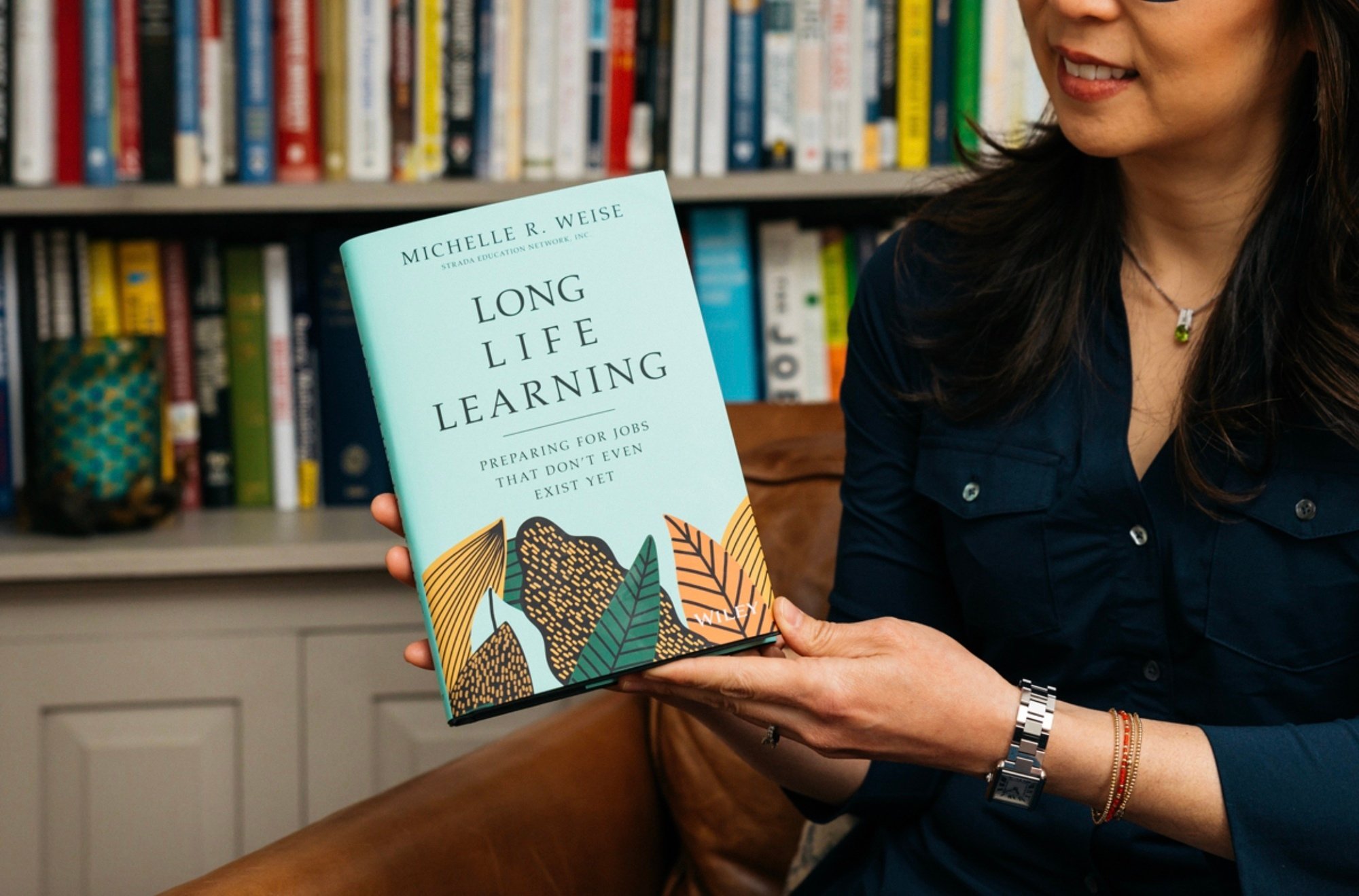"Long Life Learning": How do we prepare for the jobs of the future?
Feb 28, 2023
7 mins


Journalist
Meet Doctor Michelle R. Weise, author of “Long Life Learning: Preparing for Jobs that Don’t Even Exist Yet.” Weise explores a future of work in which our increased longevity leads to careers that span a century. What will that look like in the face of advancing technology? Can a four-year degree prepare us for 100 years of work, or will continuous, life-long education become the new normal? We sat down with Weise to chat about the future of work and education, as well as the burgeoning trend of remote and flexible work.
Let’s start with the essentials: What is long-life learning?
Everyone is obviously familiar with the term “lifelong learning” but I always found it fascinating when I would go to conferences and professional development opportunities and people would just speak as if everyone intuitively understood its meaning and importance.
I was studying the future of work and realized there was a similar inertia around the millions of jobs we were going to lose to automation and AI, and at a certain point you just kind of feel paralyzed. Simultaneously, I started reading more about how lifespans are extending; that we’re going to experience longer lives than we anticipated, and as a result, our work lives become a question mark: Will they be 50, 60, 80 years long? And for me, that was the best way to think about moving into action.
If we’re going to have to stay in this very turbulent workforce that’s being touched by exponential changes in technology, how will we keep up? So I thought, okay, we need to start building roadmaps for our long-life learning.
As you say, AI and technology are likely to develop exponentially, but where on the curve would you say we are today? What kind of changes can we already see?
It’s a really important question, partly because there’s a lot of fear-mongering happening in studies about the future of work. But when you discuss the topic with roboticists and others who work directly with technology, they’ll also tell you the real limitations of their work. In particular, I found it fascinating to hear entrepreneurs and builders state the near impossibility of training a robot to grasp something. In other words, things that just come naturally to humans, like a baby’s ability to hold something and tighten their grip at the right times, are inordinately difficult to train a robot to do. So there are deep limitations.
At the same time, we’re at this interesting moment where ChatGPT just came out — and it’s pretty fascinating to try and extrapolate the first, second, and third-order effects of that. To me, it seems likely that some of the bold predictions of AI capabilities will come true. As such, I think there’s a tremendous need, and future demand, for us as humans to flex our innately human skills: exercising judgment or leveraging our sense of ethics. We need to think ahead and extrapolate, asking: “Okay, if we build this, what are the repercussions? What if a million people use this, or two million or 10 million?”
From an educational standpoint, what can universities do to adapt?
It’s going to be really hard for many universities because the business model of higher education is very locked in, meaning it’s hard to reach the point where enough revenue is generated to make the model work. In order to introduce something altogether new, you’d have to rejigger the entire business model, which most universities really can’t — or want to — do.
But I also know about many universities that realize this is the necessary question: How do we cultivate the best problem-solvers in the world? I think that needs to be the aspiration of every higher education institution.
I read another interview where you outlined how certain skills—multidisciplinary skills, abstract thinking, analytical ability, as well as self-promotion and marketing skills—are essential to staying competitive in today’s labor market. And I think that’s true. At the same time, if I would have read that in a job description I would have been like, these guys are looking for a genius. So my question is: What if my abilities lie elsewhere? What if that sort of high-concept reasoning and analytical ability is lacking, and my skills and interests are much more narrow or specific? Would you say that the job market, then, might be increasingly unforgiving to some?
It’s interesting, I hadn’t really thought about people seeing that as an unattainable goal in terms of being a “genius.” To me, it’s less about achieving […] and more about grappling with different concepts at the same time. The schools that are doing this well are, for example, giving groups of learners a large problem to solve, or they have to build something together. As such, in the process of building, they learn lots of different disciplines at the same time. So it’s more about breaking down the boundaries of a discipline to better understand deeper structures of, and connections between, various fields and areas.
In terms of marketing and self-promotion: when it comes to transferring our skills into different areas, we’re unfortunately at a nascent stage of that evolution. But I think it’s exciting to see a lot of B2B platforms being built with AI that try to help us surface our own skills and identify paths that we didn’t really imagine as possible for us. For example, maybe I have 60% of what it takes to become a software engineer or 30% of what it takes to become a human resources manager. But once I see those pathways laid out ahead of me, it becomes clearer how to fill my skills gaps.
One of the drivers of the increasing socio-economic inequality in the US is the education system, more specifically the fact that many lack access to it. But as you argue, it seems likely the future will demand more education, and perhaps even continuous re-education. Do you see such a model as feasible in the US today?
It’s a good question. And no, currently I don’t see it as feasible for most people who aren’t earning a living wage to just decide: “I’m going to go to higher ed and skill up.” And many don’t look at higher education as a viable way of skilling up, because it hasn’t done the greatest job of connecting a learner to rewarding workforce outcomes.
But what I do see are employers shouldering more of the burden of re-skilling themselves. The companies that will survive and thrive in the future are the ones that will map out clear internal mobility pathways for their employees, reduce churn and create that sense of loyalty. More companies will be forced to carve out time in the workday to build those new skills, rather than expecting workers to do it in their spare time. I also think companies will get better at measuring the ROI of those reskilling and training investments — something they’re largely not doing at present.
So perhaps that’s what will follow the trend of gig work: a return to longer employee tenures and a greater ability to grow within a company?
Well, it’s a possibility. In the US, there used to be this archetype of a 40-year career where you stayed and retired with one company and, in the end, you got like a gold watch or something along those lines. If employers do this right, they can create a new version of that 40-year career with altogether new incentives. Because it’s simply not sustainable to lose the talent you hire because you’re not investing in their future. For example, there are such similarities between retail, customer service, marketing, and sales…all of those are very connected in terms of core skills. But we don’t teach people how to move from sales to marketing, and that needs to change.
Another potential shift suggested by some prominent business leaders is that prestigious degrees might become less relevant. Do you think alternatives like online courses tailored to a specific job could successively replace traditional degrees?
There’s great value in freestanding online courses that are connected directly to workforce needs. But the challenge for most people is proving they do, in fact, possess the necessary skills. In my book, I talk about different kinds of on-ramp programs borrowed from apprenticeship models from Europe, but I suggest flipping them into a boot camp model. That means training someone really quickly in a certain area, whether it’s lean manufacturing or front-end web development, and then hiring them directly. In other words, through these kinds of outsourced apprenticeship opportunities, the company gets to de-risk the entire hiring process, try this person out for an entire project and then say, this person’s perfect for your team.
We also hear a lot of talk about a future of more efficient and flexible work, with some suggesting that AI will contribute to that development, mainly by relieving us of the most mundane repetitive tasks…
I do think we’ll move toward more flexible work arrangements, especially if we can ramp up experimentation around portable benefits. Have you been tracking what’s going on in England with the four-day workweek?
I have, and Welcome to the Jungle has actually operated on a four-day workweek since 2018.
I think that’s super promising. In England they’re realizing people are working harder, producing more, making more money — and they’re happier. In addition, it’s not like these technologies we leverage make us more productive; they just keep us connected longer. What is fascinating about the England experiment is that when people suddenly had to squeeze five days of work into four, they started cutting down on their meetings and asking if all those meetings were actually necessary.
On a last note, even for someone like me, who spends a lot of time researching and writing about work, it often feels very hard to predict what’s to come, and the information, just like the opinions about it, is often contradictory. I think your book is pretty unique in offering a practical way forward. What is your experience of the debate around the future of work in general?
Part of why I wrote the book was that I wasn’t seeing a real positive, constructive way forward. A lot of people who work in this field are economists or researchers; they’re less focused on figuring out solutions and are more focused on articulating the problem. Mainly, my experience is that trying to figure out a way forward has been the province of venture-backed, for-profit and nonprofit startups. The challenge is that so many of those groups are working in parallel with one another, so it’s going to be a while before we see a holistic solution. What we have to do in the near term is think about ways to stitch together new and existing solutions around career navigation, wraparound support services, targeted education, ways to learn while earning a living and more transparent hiring practices. That’s the way we move toward healthy learning ecosystems for the future of work.
Photo: Samantha Watson for Welcome to the Jungle
Follow Welcome to the Jungle on Facebook, LinkedIn, and Instagram, and subscribe to our newsletter to get our latest articles every day!)

More inspiration: Inspiration for workers

From hobby to side hustle: 10 steps to turn your passion into a career in 2025
Have you been waiting for the right moment to turn what you love into a paid gig? 2025 is your time!
Dec 18, 2024

Patience, balance, and multitasking: How parenthood shaped my career
Parenthood changes everything—including your career. These working parents share exactly how.
Dec 11, 2024

The traits of a great boss (and how they make your work life better)
What makes a great boss? Effective leaders do more than manage tasks—they create a workplace where people feel supported, encouraged, and inspired.
Nov 13, 2024

Leading without limits: How to shine as a leader, title or no title
Lab expert Ginny Clarke explores how being a leader isn't just reserved for execs ...
Apr 09, 2024

How our burnt-out society can finally get some rest
Alex Soojung-Kim Pang unveils transformative strategies for slowing down our fast-paced lives.
Mar 19, 2024
The newsletter that does the job
Want to keep up with the latest articles? Twice a week you can receive stories, jobs, and tips in your inbox.

Looking for your next job?
Over 200,000 people have found a job with Welcome to the Jungle.
Explore jobs


